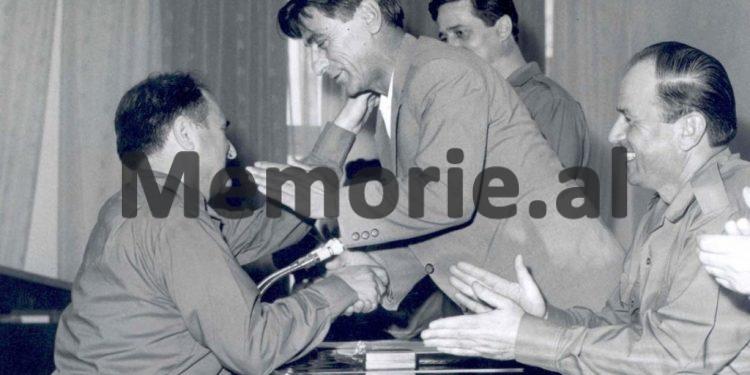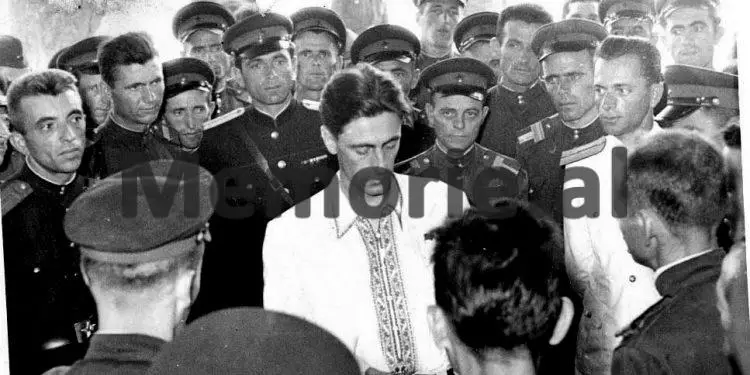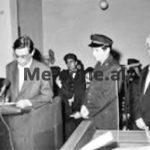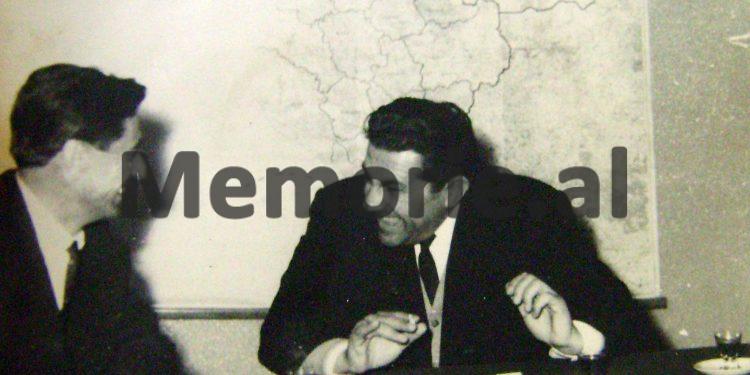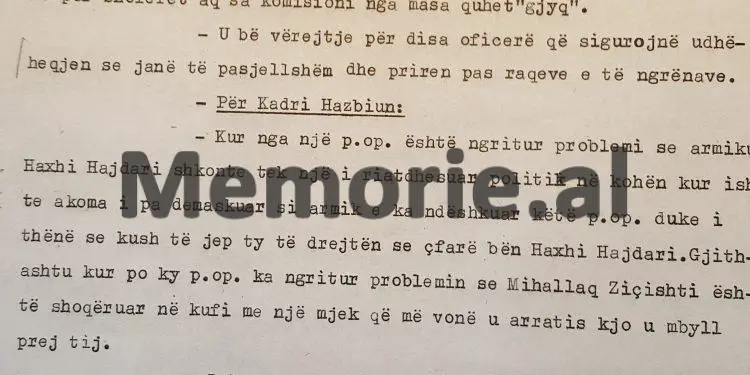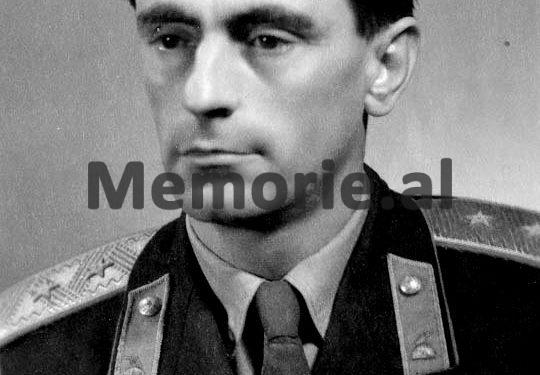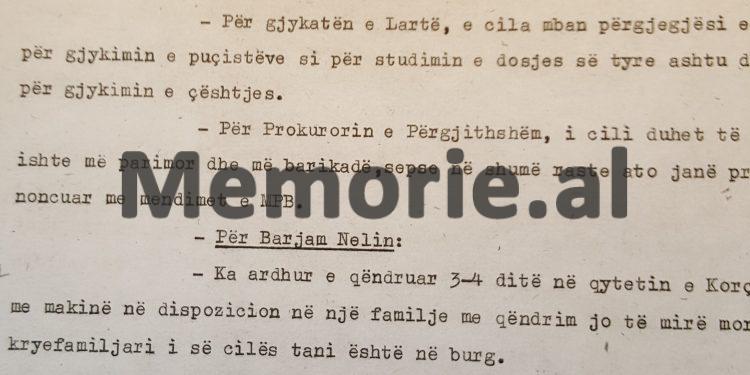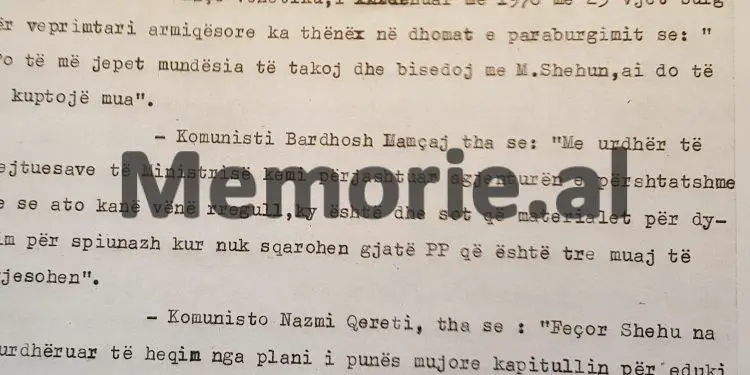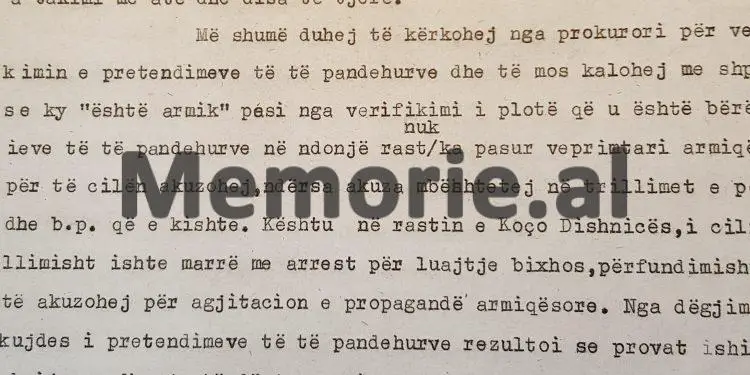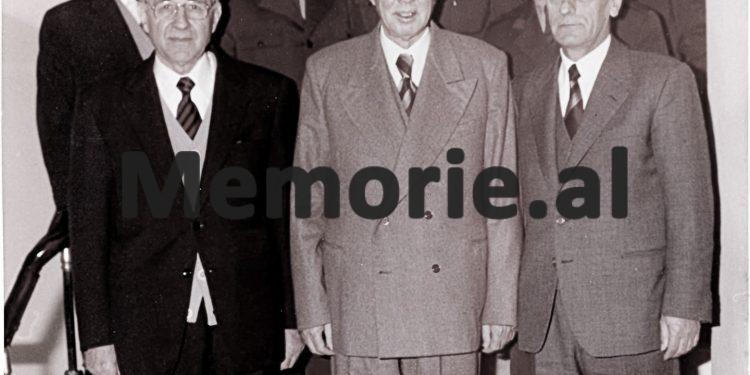Dashnor Kaloçi
The third part
Memorie.al publishes some archival documents issued by the Central State Archive in Tirana (fund of the former Central Committee of the ALP), which bear the logo “Top secret” and belong to the year 1982, where there are several information reports of the member of the Politburo, Spiro Koleka, the secretary of the Central Committee of the ALP, Vangjel Çerrava, the first secretary of the Party Committee of the Korça district, Enver Halili, etc., sent to the Central Committee of the ALP, regarding the meetings of committees of the Party of Pogradec and Korça, Branches of Internal Affairs of these districts, etc., where they had participated as delegates of the Central Committee. What was discussed in those meetings where Enver Hoxha’s letter was analyzed regarding the “Synoptic Table”, about “enemies and traitors, Mehmet Shehu, Kadri Hazbiu, Feçor Shehu, etc.”
Just a few weeks after the events of December 18, 1981, when Prime Minister Mehmet Shehu was found dead in his bedroom by a pistol bullet in very mysterious circumstances, which even today, after 40 years, are still being discussed, with by order of the Central Committee of the ALP, in all the basic organizations of the Party, throughout the country, numerous meetings were held and held, where it was discussed; “In the spirit of the speech of comrade Enver Hoxha, on the ‘Synoptic Table’ for the enemy and polyagent Mehmet Shehu” In all these meetings, among others, as it is known from a number of documents with the logo “Top secret”, found in the Central State Archive, the Archive of the Ministry of Interior and the Ministry of Defense, many participants and discussants who have taken the floor there, have made all kinds of accusations, true and false, denunciations, spies, slander, fabrications, gossip, intrigue, fabrication and everything that has suited them, all in the direction and against the former the late Prime Minister, Mehmet Shehu, his family and those who were considered their collaborators, mentioning by dozens of names, military, senior officials, etc., etc. Likewise, these meetings intensified greatly, especially after October 1982, when the Minister of Defense, Kadri Hazbiu, was arrested (who had held the delicate post of Minister of Interior for almost three decades), where he was also arrested. , the same picture was repeated, as with former Prime Minister Mehmet Shehu. And after the holding of these meetings, the party committees of the respective districts, have drafted a series of reports with summaries of the “main problems”, which were then sent to the Central Committee of the ALP. For all these meetings, the editorial office of Memorie.al, has a large number of documents extracted from a voluminous file with the logo “Top secret”, where former members of the Politburo, secretaries of the Central Committee at the time, such as Spiro Koleka, Enver Halili, Vangjel Çerrava, etc., inform the Central Committee about the meetings they attended, giving in detail everything that was said and discussed there. In addition to these reports, the file in question also contains a series of reports compiled by lower-ranking officials from the Central Committee onwards, or collegial reports of the Branches of Internal Affairs in the districts, headquarters, commands and committees. of the party of military corps, which were also the largest units that the Albanian army had at that time. From this voluminous file, in the last issue we published the report-information of the former member of the Politburo of the Central Committee of the ALP, Spiro Koleka, sent to the Central Committee, regarding the party asset of the district of Pogradec, where he participated as a delegate, on September 25-28, 1982. While starting today, we are publishing the full report-information of the former first secretary of the Party Committee of Korça district, Enver Halili, sent to the Central Committee of the ALP- on, “the hostile activity of the group of Mehmet Shehu, Kadri Hazbiu, Feçor Shehu, etc.”, which he has extracted from the meetings held in the Korça Branch of Internal Affairs as well as in the Prosecution and the Court of that district. These documents, as a rule, have been read by all Enver Hoxha, but they are not signed by him and there is not even any note, as he has done with all other documents over the years, which from some reliable sources, it is said that Enver, they have read them, because of his aggravated health condition.
follows from the previous number
Enver Halili’s secret report on Enver Hoxha and the Central Committee of the ALP
ALBANIAN LABOR PARTY Top secret
DISTRICT PARTY COMMITTEE
Korça, October 28, 1982
I N F O R M A C I O N
For
SOME PROBLEMS THAT RISE FROM DISCUSSION OF CONCLUSIONS
POLITICAL BUREAU AND THE 5TH Plenum of the Central Committee of the Party
IN THE BASIC PARTY ORGANIZATIONS OF THE LABOR BRANCH OF
DOMESTIC AND THE PROSECUTOR-COURT
For Feçor Shehu:
-In 1979 in Lezha there was a report that saboteurs would come to the hunting area, he told the chairman of this branch that: “In Lezha there were no gangs even when they came in large numbers.”
-With the actions he carried out in 1954 in the direction of Reshat Qemali’s gang, by not evaluating the data, for her arrival, and taking weak measures, four comrades were killed.
For Mihallaq Ziçishti:
- Together with Mehmet Shehu, they returned 2-3 times the blow of Tefik Cangoi, who after his arrest was deciphered as a Greek intelligence agent.
- It did not go to the end of the Bracan trial in 1959-1960, which was in the service of Greek intelligence.
- He violated the rules of the border regime by firing on the border belt and area, even with weapons.
- He went to dinners and lunches for people with bad biographies, both in the Lozhan area and elsewhere.
- For the Supreme Court, which is also responsible for the trial of the coup plotters, both for the study of their files and for the trial of the case.
- For the Attorney General who should have been more principled and barricaded, because in many cases they have been pronounced with the opinions of the Ministry of Internal Affairs.
For Bajram Neli:
He came and stayed for 3-4 days in the city of Korça with a car available to a family with a bad moral attitude, whose head of the family is now in prison.
For Merdar Hasa, branch president in Gjirokastra. He had ill company with Feçor Shehu and Bato Karafili, he killed pigs and took them home. He was arrogant and arrogant even in the basic organization of the party.
In addition to what we said above, the communists also raised these issues:
For Gani Kodra, data have emerged since 1972, implicating him in smuggling with the Italians. Kadri Hazbiu said: “we saw it, but we must make an exception”.
In 1979 we had information – continues the communist Bajram Sulejmani, about the kulaks of the Mata Coast, that they are a connection of the Yugoslavs, but Feçor Shehu rejected us and this issue was closed.
Communist Kasëm Skëndo, cipher in the Branch, said: “In 1977 I was called by Andon Deçka by order of Feçor Shehu and I was given the task to compile a special double digit that has not been used until today, to be strong, that can communicate two people in Albanian, French, or another. After I did it and they gave him the nickname “Karadaku”, I gave the explanations, by order of Feçor Shehu and Bato Karafili, I was transferred to Korça contrary to the decision taken earlier in the Party Committee of the Ministry. He told me about this: “Comrade Hysni Kapo ordered that you are a party candidate”.
Kiço Ventiku, sentenced in 1976 to 25 years in prison for hostile activities, said in the detention rooms that: “If I am given the opportunity to meet and talk to Mehmet Shehu, he will understand me.”
Communist Bardhosh Mamçaj said that: “By order of the leaders of the Ministry, we have excluded the appropriate agency and that they have put in order, this is today that the materials for suspicion of espionage when not clarified during PP (preliminary processing) which is three months, to are annihilated”.
Communist Nazmi Qerreti, said: “Feçor Shehu has ordered us to remove from the monthly work plan, the chapter on ideo-political education and the tasks that the Party poses for us.”
The communist Sotir Ndrio said: “When we arrested Janaq Foton in 1969 in Kamenica, he told us: You see your people are not okay, when we informed the Ministry they took him and investigated him there”.
- PROSECUTOR – COURT
These problems arose in the Prosecutor’s Office. The control of the Prosecutor over the investigative bodies has not responded in all cases to the tasks assigned by the Party as a control of legality. There have been cases since the comrades working in the Control and Investigation sector during the control of the isolation rooms in some cases have been found persons entered in them and was not allowed to be checked by the prosecutor, on the grounds that this prisoner is secret.
In these cases, the prosecutor did not insist on seeing whether or not this detainee was placed in solitary confinement rooms within the legal rules, but he believed the statements of the employees of the Internal Affairs Branch.
This is the case in 1975 when Pirro Naçi was arrested for writing hostile slogans, the prosecutor did not get in touch with him, after he was taken to Pogradec for investigation by the former Deputy Director of State Security, Lirim Pëllumbi. he was returned to Korça, but the prosecutor was barred from meeting him and several others.
More should have been requested from the prosecutor to verify the allegations of the defendants and not to pass with the hope that this “is an enemy”, because from the full verification that was done to the statements of the defendants in any case, there was no hostile activity for him which he was accused of, while the accusation was based on fabrications of the operative worker and his accomplice.
Thus, in the case of Koço Dishnica, who was initially arrested for gambling, he would eventually be charged with agitation and hostile propaganda. From the careful hearing of the defendants’ allegations, it resulted that the evidence was created and not heard as reflected in the materials of the investigative case, eventually the defendant was sent to court only with the gambling offense.
Procrastination of cases has also come as a result of the wrong practice that for any action that has to do with the proof of the case, especially in crimes against the state, he does only after a conversation with the chairman of the Internal Affairs Branch. Thus, although the investigator has completed the investigation, the case is held on the grounds that it will be analyzed by the Branch President, who orders the closure or continuation of the investigation. In these cases, the control of the prosecutor was not at the right level and he agreed with these delays and often approved the extension of the deadline for the continuation of the investigation, while the file in court went with the evidence obtained from the beginning of the investigation.
In any case of crimes against the state, agitation and propaganda, there were the same witnesses, with bad personalities, who were later convicted of agitation and propaganda as in the case of Arqile Kita, these actions should have attracted the attention of the prosecutor and court.
The prosecutor has limited control over the adjudicated files. In the constitution, the prosecutor is never restricted in exercising control, while with the guidance of the High Court, the district courts have limited this right within certain deadlines of 5-10 days. The setting of these deadlines is a restriction and obstacle that is made to the prosecutor to exercise the right of control, when he deems it necessary. This case was told to the comrades of the General Prosecutor’s Office but no solution was found.
The opinion was expressed that the new system of judicial organization (judicial councils) leaves room for subjectivism and is not objective in the administration of justice. Judicial councils that are close to the district court should not be subordinated to the President of the district court, but should be established separately. Also, for the charge of the court for cases that it investigates and judges itself, it leaves even more room for subjectivism because the judge who will start a case and perform actions with it will also solve the security measure, which is with consequences for the defendant. In these cases, the judge is invested to resolve as he started and not otherwise.
The opinion was expressed that the investigative body should be a separate body, separated from the Ministry of Internal Affairs and the Directorate of Investigation should depend directly on the Presidium of the People’s Assembly, in order to maintain as much objectivity in the investigation of cases and not responsibility is distributed.
The sentencing policy in some cases was not fair, there were cases that could have been dismissed without being sent to court. There have also been criminal cases for crimes against the state which, despite the court’s insistence that they should be charged with treason, have been brought to trial on charges of agitation and propaganda, such as the case of Koço Dhima. Also, in the case of Haxhi Baçi, Jorgo Llafazani and Xhevat Zezo, the investigations have become shallow and the file does not reflect their full agency activity.
In some cases, the employees of the Internal Affairs Branch did not appear in court as witnesses, although they did, with the reasoning according to the orientation given by the enemy Feçor Shehu and that their personality should be preserved. But when the district Party Committee was notified by the court, this problem was rightly resolved.
Employees of the investigative bodies were very much afraid of the innocence given by the court for the fact that these issues became a problem for the minister and he to do the disaster. These have influenced the negative work of the investigation, which has dismissed some of the cases for lack of evidence, or has sent some of them to court only at the insistence of the prosecutor.
In the investigative bodies, some criminal offenses were prosecuted with only one witness and they pleaded guilty, as they were not told by the fellow investigators that they had special evidence and Judge Kiço Treska agreed with them. Trials have also been held on 2-3 cases with the same witnesses.
The comrades of the Prosecution should not have accepted some unjust actions of the Investigation such as the cases for dismissal of cases with subject persons of internal bodies (police) etc. and were not taken to court.
In some court proceedings as well as during the control of the prosecutor, the comrades of the prosecution and the court have not gone deep enough to raise a problem related to hostile activities. The investigation of a case of attempted escape and agitation and propaganda has shown that Vat Kola, the son of comrade Marash Kola, is also implicated, who also has incorrect behavior and appearance for our society. Marashi should reflect on his son’s faults and wrongdoings and although he has been advised and criticized by the District and Branch Party Committee, as well as by the Party’s grassroots organization, he bears heavy responsibility.
The enemy Feçor Shehu gave the order to the investigation organization not to prosecute O… Q…, N… P….’S sister, who was an accomplice in a group organized for major thefts. At the request of the district prosecutor in the District Party Committee and with the General Prosecutor, investigations were launched against her and in a state of arrest the court also found her guilty.
Considering the discussion made only as the beginning of their work, the basic organization of the Party set as a task to continue the work to help the party in deepening this hostile activity, drawing from specific facts right conclusions, to increase the preoccupation for the ideo-political education with the materials of the Party and the teachings of comrade Enver to liquidate the consequences of this activity in the body of internal affairs, the court and the prosecutor, further increasing the intelligence force and the revolutionary vigilance.
These were in summary the issues that were raised in the Committee and the basic party organizations in the Internal Affairs Branch as well as the Prosecutor-Court.
All meetings were attended by delegates of the District Party Committee, comrades of the Bureau and the secretariat of the District Party Committee. /Memorie.al




